BANK OF ALBANIA
PRESS RELEASE
Bank of Albania organises the Annual Conference ''Inflation is Back: How to Deal with It Under Heightened Uncertainties?'
Publication date: 27.10.2022
On 27 October 2022, the Bank of Albania co-organises with the London School of Economics and Political Science (LSE) the Annual Conference: ''Inflation is Back: How to Deal with It Under Heightened Uncertainties?"
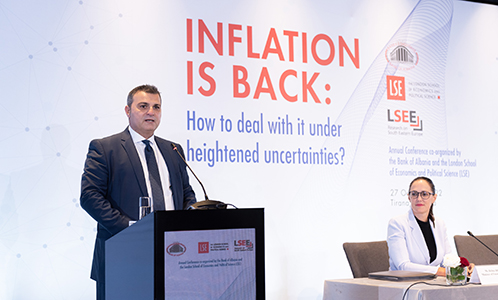
This conference is organised under the auspices of the Governor of the Bank of Albania, Mr Gent Sejko, and is attended by the Minister of Finance and Economy, Ms Delina Ibrahimaj, representatives from the Albanian Government and members of the Albanian Parliament. The conference is also attended by high-level representatives from other central banks, diplomatic corps in Albania, international financial institutions - such as the International Monetary Fund, the World Bank, the European Bank for Reconstruction and Development, representatives from the academia, the banking and financial systems, the media, and staff members of the Bank of Albania.
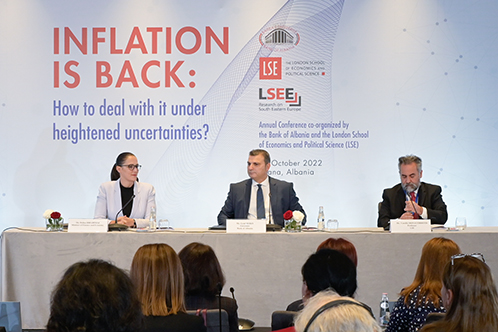
This is the 16th Annual Conference of the Bank of Albania and the third one co-organised with the London School of Economics and Political Sciences (LSE), among the top 10 universities in the world in the field of social, economic, political and international studies.
Organised in three sessions, conference proceedings were opened by the Governor of the Bank of Albania, Mr Gent Sejko; the Director of LSE’s Research on South East Europe, Professor Vassilis Monastiriotis; and the Minister of Finance and Economy, Ms Delina Ibrahimaj.
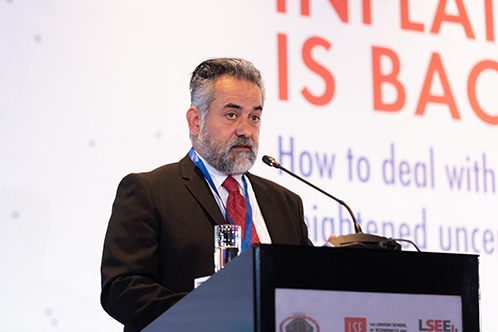
In his address, Governor Sejko presented the view of the Bank of Albania on the challenges that soaring inflation has on: the Albanian economy; economic actors; society; and on the decision makers. The Governor stated that the rapid hiking inflation originates from foreign supply-side shock, but it has already begun to be transmitted into the cost structure of the Albanian economy and in the inflation expectations in the Albanian economy. As such, inflation sources appear strong and persistent, jeopardising both the financial and economic stability in Albania, and in turn calling for the intervention of monetary policy. Based on these considerations, the Bank of Albania has embarked on a normalisation of its monetary policy stance. This normalisation is indispensable to safeguard the price stability and benefits both the economy and society in the medium and long term.
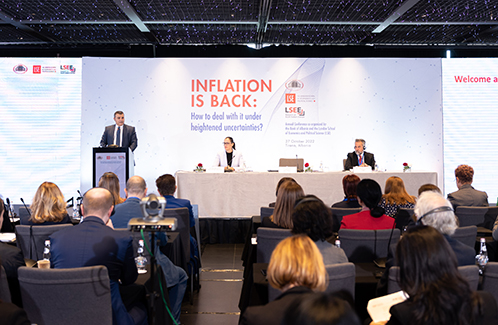
Mr Sejko highlighted that in parallel with inflation control, the monetary policy normalisation will not affect the economic growth perspectives. Though economic growth is expected to decelerate somewhat in the short-term horizon, it will stay in positive territory, and return back to its normal trend over the medium and long term. For this reason, the assessment on economic growth sustainability affects the monetary policy stance. This sustainability, among others, is based also on the balance sheets’ soundness of economy and on the monetary and financial stability of the country. In addition, this stability has reflected the continuous work and structural reforms undertaken by the Bank of Albania and the Albanian authorities throughout these years.
Concluding, Governor Sejko pointed out that the Bank of Albania has a clear and contemporary methodology for compiling and implementing its policies. This methodology guarantees the policies to be coherent and optimal for the development of Albania.
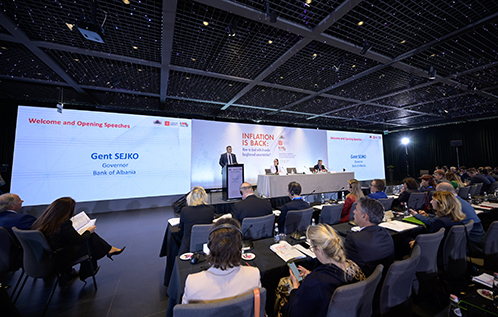
Governor Sejko thanked the participants and added that the panellists’ conclusions will be very useful to identify not only the present challenges, where the inflation hike is the primary one, but also the challenges for the future, which will increasingly affect growth in our economies in the near future. In this context, he pointed out that economic analysts and decision-taking institutions should increasingly pay attention to the climate changes, demographic trends, and the impact of technological and financial innovation on the economy to identify the possible consequences and the adequate reaction to counter them.
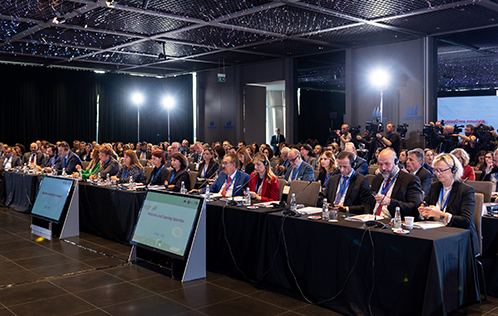
The first session will address the reasons inflation is back in both advanced and emerging economies, as well as the actions central banks can take to keep it under control.
In the second session discussions will focus in the efforts of central banks to keep inflation under control while their responsibilities expand into other areas.
The third session, Governor’s panel, will be moderated by Cristian Popa, Former Senior Advisor to the Vienna Initiative Steering Committee and Former Deputy Governor of the National Bank of Romania. This panel will bring together central bankers and international experts, namely: the Governor of the Bank of Albania, Mr Gent Sejko; the Governor of the National Bank of the Republic of North Macedonia, Ms Anita Angelovska Bezhoska; the Deputy Governor of the National Bank of Hungary, Mr Barnabás Virág; Member of the Board of Director, National Bank of Romania, Mr Csaba Bálint.
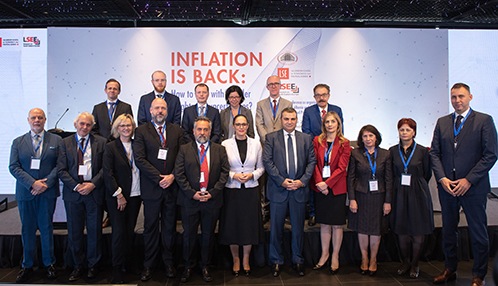
The traditional Governor’s Panel will discuss and share experiences in dealing with the COVID pandemic and now the subsequent surge in inflation and options for policy normalization, while confronting their specific monetary policy, economic and financial stability challenges. Governors will articulate their vision on the future challenges for central banks in the region and reflect on the optimal policy mix to achieve their objectives, and continued support from the ECB for this new and particularly challenging policy phase.
- Welcome address by Gent Sejko, Governor of the Bank of Albania.
- Bank of Albania Annual Conference 2022: Conclusions
- Photo gallery

 Twitter
Twitter
 Youtube
Youtube
 Facebook
Facebook
 Flickr
Flickr
 RSS
RSS
 Subscribe
Subscribe
 Feedback
Feedback